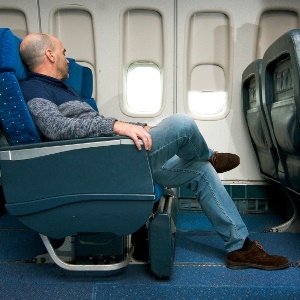
Staying put during those long-haul flights may be more than just uncomfortable – especially when you are back in economy class – it may have ill effects on your health, and could even kill you.
In the general population, you have about a 1 in 1,000 chance of developing deep vein thrombosis (DVT) - a condition where blood clots form due to poor blood flow brought on by sitting or lying passively for a long time. Your chances of developing DVT drastically increase if you are a frequent flyer, or undergo surgery that requires you to stay still in order to recover.
Read: Exercise helps deep vein thrombosis complications
In fact, it is believed that as many as 6 in every 10 people undergoing this type of surgery may develop a blood clot if they are not treated, said Professor Sylvia Haas, Director of the Haemostasis and Thrombosis Research Group at the Institute for Experimental Oncology and Therapy Research at the University of Munich in Germany, during a recent visit to Cape Town.
DVT can become fatal if a pulmonary embolism develops - when a piece of blood clot breaks off from the site of origin and travels via the veins in the body through the heart to the lungs where it can cause very serious damage, and even death.
Read: Keep those travel legs moving
In recent years, greater awareness of the disease has lead to prevention and early diagnosis. But at the same time, surgery, especially orthopaedic surgery such as hip and knee replacement, is more common in the elderly than a few decades ago, subsequently increasing the risk of DVT.
"And in South Africa there is a special situation in that patients with HIV are at a very high risk for developing venous thromboembolism [VTE - blood clots in the veins]," says Haas.
Treatment options
Until now, the treatment for DVT, although effective, is difficult to manage and administer. Anticoagulant (blood thinning) medication is used for the prevention and treatment of the formation of blood clots. But while current medication has been around for many years, both doctors and patients find them challenging in terms of their predictability and limitations, as well as their trickiness to administer.
Many of the available options need to be given by injection, and the current oral anticoagulant requires blood levels to be monitored routinely by a medical professional in order to determine the correct dosage.
Read: Cabin air linked to DVT
A new medication for the prophylactic treatment of VTE in patients undergoing orthopaedic surgery of the lower limbs was recently introduced in South Africa, and should go a long way in addressing the existing unmet needs of patients and doctors with respect to anticoagulation therapy.
The medication is currently only intended for use in a prophylaxis patients undergoing hip- or knee-replacement surgery, but the developers hope that in due course the it may also be applied for other uses, perhaps even for use as a preventative measure for DVT in air travellers.
Who is at risk?
People in the following groups are at an increased risk for developing DVT:
- Frequent travellers on long-haul flights.
- People undergoing hip- and knee replacement surgery.
- Patients who are immobilised for prolonged periods of time.
- People with genetic clotting disorders.
- Women are at an increased risk of developing DVT than men.
- People using oestrogen and progesterone oral contraceptive (the Pill).
- Pregnancy, smoking and obesity have also been found to increase the risk of blood clot formation.
Read more:
Travelling increases thrombosis risk
Leg pain signals deadly blood clots




 Publications
Publications
 Partners
Partners















